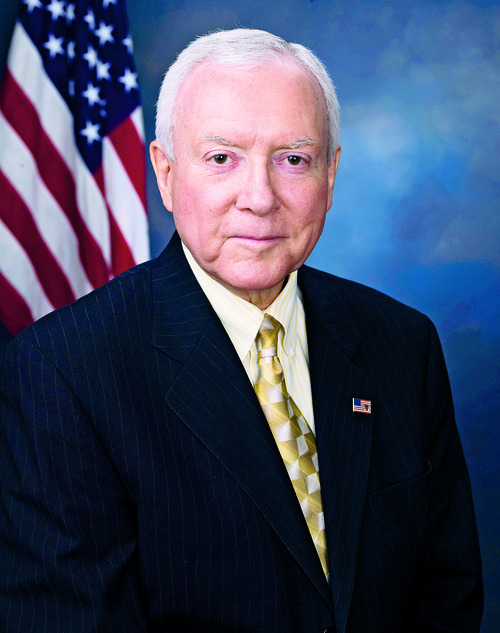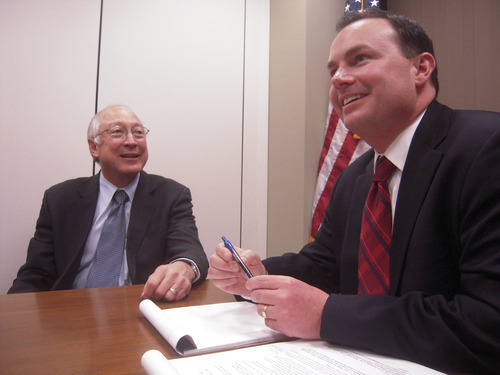This is an archived article that was published on sltrib.com in 2011, and information in the article may be outdated. It is provided only for personal research purposes and may not be reprinted.
Washington • Both of Utah's senators are seeking to amend the U.S. Constitution to require Congress to balance the federal budget every year, though freshman Sen. Mike Lee's proposal cuts deeper than his senior colleague's plan.
Still, while Sen. Orrin Hatch's bill and Lee's differ, both say they are eyeing the same goal: rein in spending and make the federal government live within its means.
Hatch formally introduced his bill this week that would bar Congress from passing a spending plan that tops 20 percent of the gross national product, essentially a measure of how much the nation produces in labor and goods in a given year.
Lee's proposal, which he also offered this week, would set the limit at 18 percent of the GDP, a threshold Hatch previously said he'd like to see but that isn't politically viable.
And the two also differ on another major point: Hatch's proposed amendment allows Congress to override the balanced budget requirement if a majority of the House and Senate declare war or says there is an imminent national security threat.
Lee says that's a loophole in the amendment, and his bill doesn't offer it.
Still, both Lee and Hatch see wiggle room in their proposals and argue it's good to have divergent points to debate. In the end, their measurers could be combined.
"At some point I strongly suspect that's what will happen," Lee says. "In the meantime, I think it's helpful to have competing versions so that different senators can debate the relative merits of each one and try to achieve some consensus on what's the best way to go."
Hatch, too, doesn't see it as competition between himself and his colleague.
"Mike made a commitment to the people of Utah that he'd fight for a balanced budget amendment — and I'm glad he did," Hatch said. "With this shared goal, I know we can make this happen once and for all. The more people pushing for this absolutely critical constitutional amendment, the more likely we are to actually get it through so we can finally bring some fiscal sanity back to Washington."
Hatch has attempted to add a balanced budget component to the Constitution a dozen times in the past, coming close in 1997 but losing by one vote in the Senate. A constitutional amendment requires approval by two-thirds of each chamber of Congress and then approval by three-quarters of the state legislatures.
Opposition to the amendment, however, will be strong.
Some economists argue that a balanced budget amendment could wreak havoc on the federal budget, impacting vital programs, and wouldn't allow government to do what it needed to do in times of economic downturn.
Charles Schultze, a senior fellow emeritus at the left-leaning Brookings Institution who has testified about the balanced budget amendment before Congress, says such an amendment could be disastrous for the country in that it would be extremely hard to get lawmakers to cut or get two-thirds of Congress to raise taxes.
For example, before the economic crisis of the last two years, tax revenues were 18 percent of the GDP, but that dropped to 15 percent during the downturn, leaving a $400 billion to $500 billion gap that, under the amendment, would have just had to be cut, he said.
"You don't know what you're setting up by way of a deadlock," said Schultze, a former chairman of the Council of Economic Advisers under President Jimmy Carter.
He noted that such an amendment would bar things like the stimulus act that has been credited by some with keeping America out of another Great Depression.
"You can debate how bad it would have been, but without it, we'd have been in a helluva lot worse shape," Schultze said.
Lastly, the economist says that in reality, passing such an amendment would just mean the federal government would create "off-budget" authorities to borrow money, similar to how state and local governments don't count road and school construction projects in their annual budgets.
Hatch has lined up various groups backing his bill, including Americans for Tax Reform, American Conservative Union, and the National Taxpayers Union.
Lee, too, has backing from ATR, as well as from the Americans for a Balanced Budget Amendment and several tea party groups.
Alan Parks, the founder of Americans for a Balanced Budget Amendment, says he's more a fan of Lee's proposal since it doesn't have the so-called war opt-out and Congress would need two-thirds of each body to go over the budget cap.
With a war loophole, Parks says, "they would be off the hook for years and years or even decades. Look how long the war in Afghanistan has been going on. That would be the kind of thing Congress would use to override the balanced budget amendment."
Lee's amendment proposal has attracted seven fellow GOP senators as co-sponsors; Hatch's bill now carries 23 Republican sponsors.





